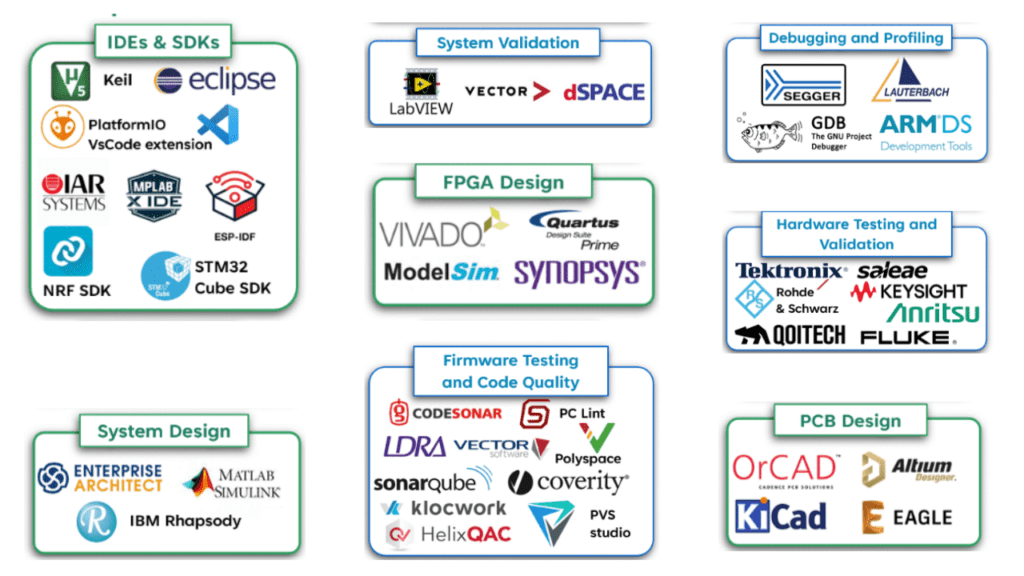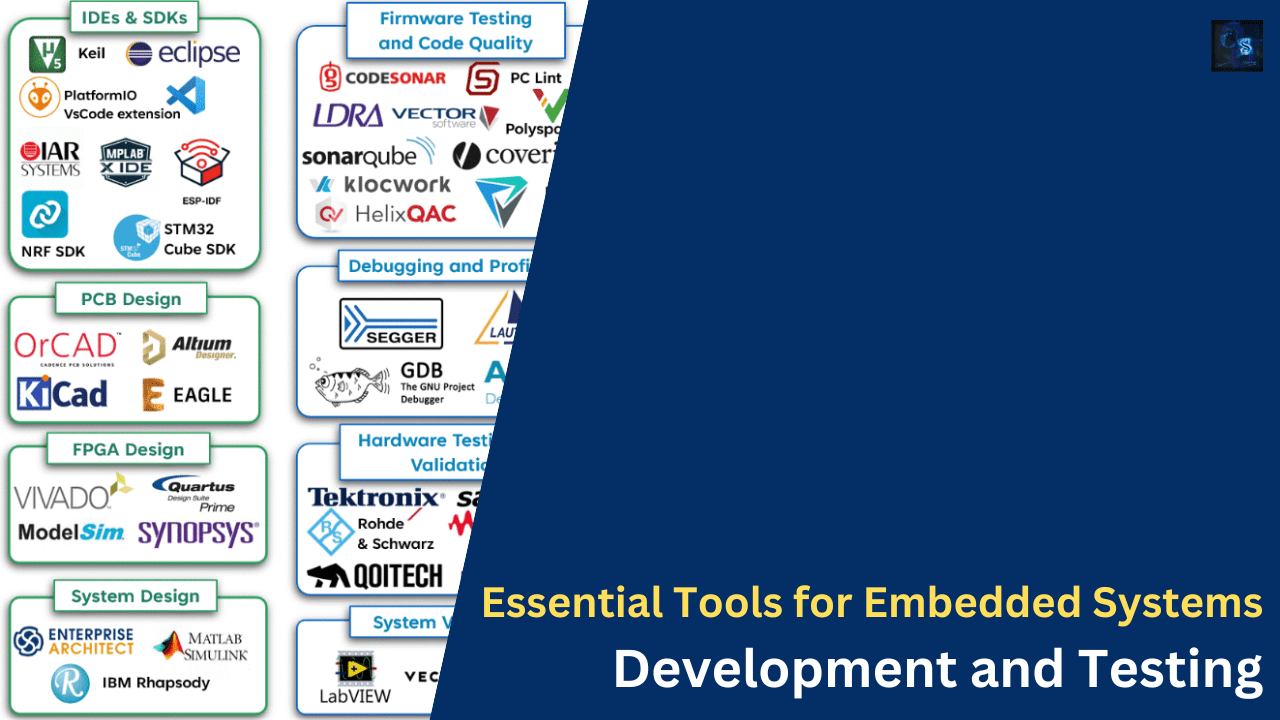Essential Tools For Embedded System Development And Testing
Hello guys, welcome back to our blog. Here in this article, we will discuss essential tools for embedded system development and testing and the purpose of each tool.
Ask questions if you have any electrical, electronics, or computer science doubts. You can also catch me on Instagram – CS Electrical & Electronics
- Advantages Of Digital Twins In Automotive Manufacturing And Vehicle Development
- Cloud-Based HiL Testing: Benefits And Challenges
- List Of Automotive Companies: OEMs, Product-Based, And Service-Based Firms
Tools For Embedded System Development
Embedded systems are integral to modern technology, powering everything from consumer electronics to industrial automation. These systems combine hardware and software to perform dedicated functions efficiently. Given their critical role, it is essential to use the right tools for designing, developing, and testing embedded systems to ensure reliability, security, and performance.
This article explores the essential tools required for embedded system development and testing. The tools are categorized into two broad groups:
- Development and Design Tools
- Testing and Validation Tools

Development and Design Tools
01. IDEs & SDKs (Integrated Development Environments & Software Development Kits)
IDEs and SDKs streamline embedded software development by providing code editors, compilers, debuggers, and libraries tailored to specific microcontrollers and architectures.
Popular IDEs & SDKs:
- Keil: A widely used IDE for ARM-based microcontrollers, featuring a powerful compiler and debugging tools.
- Eclipse: An open-source IDE for C/C++ embedded development with extensive plugins and community support.
- PlatformIO (VSCode Extension): A cross-platform development framework supporting multiple embedded architectures.
- IAR Systems: A professional-grade compiler and debugger suite known for high-performance embedded applications.
- MPLAB X: A Microchip-specific IDE for developing applications for PIC and dsPIC microcontrollers.
- ESP-IDF: The official development framework for ESP32 microcontrollers.
- NRF SDK: A dedicated SDK for Nordic Semiconductor’s wireless and Bluetooth-based MCUs.
- STM32 Cube SDK: An STM32 development ecosystem with libraries and tools for rapid prototyping.
02. PCB Design Tools
Printed Circuit Board (PCB) design is a crucial step in embedded system hardware development, ensuring signal integrity, power distribution, and manufacturability.
Leading PCB Design Tools:
- OrCAD: Industry-standard PCB design software with powerful simulation and analysis features.
- Altium Designer: Advanced schematic capture and PCB layout design with strong collaboration features.
- KiCad: A free and open-source PCB design tool with extensive functionality for professional use.
- EAGLE: Autodesk’s PCB design software, integrates seamlessly with mechanical design tools.
03. FPGA Design Tools
Field-Programmable Gate Arrays (FPGAs) play a vital role in high-speed data processing, signal processing, and embedded computing.
Key FPGA Design Tools:
- Vivado: Xilinx’s FPGA design and verification tool.
- Quartus Prime: Intel’s FPGA development environment.
- ModelSim: A powerful simulation tool for FPGA and ASIC designs.
- Synopsys: A comprehensive suite for FPGA synthesis and verification.
04. System Design Tools
System-level design tools help engineers model, simulate, and validate complex embedded systems.
Leading System Design Tools:
- Enterprise Architect: UML-based system modeling tool for embedded systems.
- IBM Rhapsody: A model-based system engineering (MBSE) tool for embedded development.
- MATLAB Simulink: A widely used tool for simulation and model-based design of embedded control systems.
Testing and Validation Tools
01. Firmware Testing and Code Quality
Ensuring firmware quality is critical for safety, security, and performance in embedded systems.
Essential Firmware Testing Tools:
- CodeSonar: Static analysis tool for detecting security vulnerabilities.
- LDRA: Compliance testing for automotive, aerospace, and medical applications.
- Vector Software: Unit testing suite for embedded systems.
- PC Lint: Static code analysis for C/C++.
- SonarQube: Continuous code quality management.
- Polyspace: Runtime error detection via static analysis.
- Klocwork: Code security and quality analysis.
- Coverity: Automated detection of software defects.
- Helix QAC: MISRA compliance verification.
- PVS Studio: Static code analysis for embedded software.
02. Debugging and Profiling Tools
Debugging and profiling tools help identify software errors, memory issues, and performance bottlenecks in embedded systems.
Popular Debugging Tools:
- SEGGER J-Link: Real-time debugging for embedded MCUs.
- Lauterbach: Advanced debugging and tracing solutions.
- GDB (GNU Debugger): Open-source debugger for embedded applications.
- ARM DS (Development Studio): A debugging and analysis tool for ARM-based systems.
03. Hardware Testing and Validation Tools
Hardware validation ensures proper functioning, electrical integrity, and compliance with design specifications.
Leading Hardware Testing Tools:
- Tektronix: Oscilloscopes and signal analyzers.
- Rohde & Schwarz: RF and wireless testing solutions.
- Saleae: Logic analyzers for digital signal debugging.
- Keysight: Industry-leading test and measurement instruments.
- Anritsu: RF and wireless testing solutions.
- Qoitech: Energy profiling tools for low-power embedded devices.
- Fluke: Multimeters and electrical test equipment.
04. System Validation Tools
System validation ensures that embedded products meet functional and performance requirements before deployment.
Top System Validation Tools:
- LabVIEW: Test automation and hardware interfacing software.
- Vector: Automotive embedded system validation tools.
- dSPACE: Real-time simulation and validation for embedded control systems.
Conclusion
The right set of development and testing tools is crucial for ensuring the reliability, efficiency, and robustness of embedded systems. Choosing tools based on project requirements, hardware constraints, and industry standards can significantly impact product success.
Future Trends:
- Increasing use of AI-driven development and debugging tools.
- Cloud-based embedded development and validation environments.
- More advanced model-based design and simulation tools.
- Integration of cybersecurity measures in embedded software testing tools.
By leveraging these tools, engineers can develop high-quality embedded systems, reduce time-to-market, and enhance product performance.
This was about “Essential Tools For Embedded System Development And Testing“. Thank you for reading.
Also, read:
- 100 + Electrical Engineering Projects For Students, Engineers
- 1000+ Automotive Interview Questions With Answers
- 1000+ Electronics Projects For Engineers, Diploma, MTech Students
- 1000+ MATLAB Simulink Projects For MTech, Engineering Students
- 50 Advanced Level Interview Questions On CAPL Scripting
- 500+ Embedded System Projects For Engineer, Diploma, MTech, PhD
- 500+ Projects For Diploma Electrical, Electronics Student, Diploma Project
- 8051 Microcontroller Timers, TCON Register, TMOD Register









